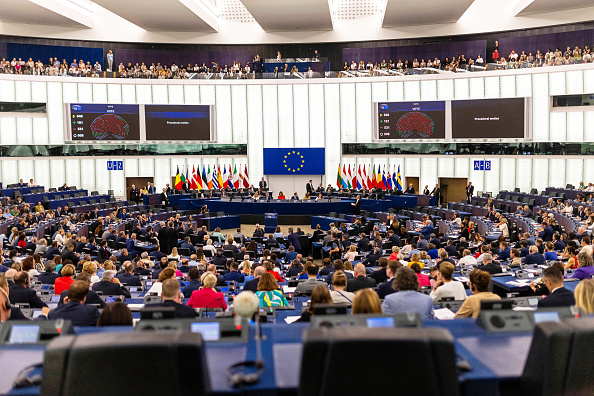Investing in Nature: The Competitive Edge for a Resilient Economy
Our economy relies on nature, yet the economy also impacts nature in profound ways. This Op-Ed highlights the need for policy to support financial flows for Nature-based Solutions (NbS) to build a more resilient and competitive economy.

In Europe, droughts are getting longer, floods are becoming more frequent, and biodiversity is declining. The costs of global climate and nature crises are already showing up in balance sheets: it is estimated that over half of global Gross Domestic Product (GDP) is “moderately or highly dependent on nature”.
As the bill keeps rising, one thing is becoming increasingly clear: nature is a fundamental part of the solution. The Multiannual Financial Framework 2028-2034 provide a clear opportunity to integrate and, crucially, increase financial flows for nature in the EU.
Cities are already saving money and generating a range of other benefits by integrating nature into new developments. In Stockport, UK, a new bus interchange was built with an integrated roof garden and drainage system. As well as creating a nice space for people, it is estimated that £116,000 was saved in avoided costs compared to the alternative grey infrastructure drainage. What’s more, it also created habitat for wildlife.
These are Nature-based Solutions (NbS) – actions that protect, conserve, restore and sustainably manage nature in a way that delivers multiple benefits. NbS can make our economies both more resilient and more competitive – and create societal and ecological benefits. Ignoring the vital role nature plays in our economies can lead to huge shocks. Just think of the damage and disruption floods cause to transport infrastructure and supply chains. NbS can save costs, reduce risks and generate benefits for people, nature and the economy. So why aren’t they implemented more widely?
The answer is often a lack of financial flows. A new report by NetworkNature aims to guide investors, businesses and Nature-based Enterprises (NbEs) to the latest research, insights and project contacts emerging from EU-funded initiatives – helping them understand where and how to invest in NbS. Yet, these actors don’t operate in a vacuum. Policy is key to provide the private sector with both the incentives and the legal framework needed to reshape the financial landscape and significantly scale up investment in NbS.
The majority of funding for NbS currently comes from the public sector. Although there are indications that EU biodiversity funding has increased, there is still a big ‘gap’ between the amount of funding that is available for NbS, and the amount that is needed for them to reach their full potential.
The EU already recognises our dependence on nature, the need for an economy that serves people and the environment, and the role that NbS have to play in this. EU policies such as the EU climate adaptation strategy and the EU Nature Restoration Regulation increasingly advocate for leveraging private investments to meet environmental and other goals, especially through NbS. The EU policy and legal framework has the potential to enable a significant increase in finance for NbS – particularly from the private sector. For example, the Corporate Sustainability Reporting Directive, and the wider move towards requiring major companies and investors to disclose how their investments align with the EU taxonomy for sustainable activities and define corporate strategies to reduce their footprint on biodiversity and climate, is likely to increase financial flows towards NbS.
Nature credits are also being considered: the European Commission recently released the EU’s Roadmap towards Nature Credits. While many people see potential in credit mechanisms, there are clear warnings that they will collapse without robust scientific baselines, transparent monitoring, and strong social equity safeguards. As outlined in ICLEI’s recent paper, the integrity of nature credits is vital to drive an effective and equitable market. Aligning credits with the Nature Restoration Regulation could be a powerful lever, but greenwashing has potential to destroy the market.
Perhaps counterintuitively, what we often hear from the private sector is that greater (although not necessarily more) regulation is needed to support private sector investment in NbS. Unless we value nature in our economy and, crucially, deliver an economic penalty to those who damage or undermine it, businesses who are looking to do the ‘right thing’ will struggle to make the business case for NbS.
NetworkNature’s research into how policy changes could create a shift in thinking, financial flows and action to support a resilient and competitive economy in the EU yielded some key take-aways:
- Compliance schemes have an important role to play. Requiring public and private sectors to recognise their dependencies, and protect, conserve, restore and sustainably manage nature will result in financial flows to the implementation of NbS and reinforce the vital services that the economy relies on.
- Standardisation enables scale. Every NbS project is unique and place-based, but finding opportunities to align and standardise specific NbS (such as urban greening) could help reduce transaction costs, increase investor confidence and contribute to building a pipeline of investable NbS projects.
- Coordinated planning is key. Many NbS operate at the landscape scale, so planning at this level is important. National and cross-governmental alignment is key to successful land-use planning. Without it, there is a risk of public money working against itself.
- Public procurement policy could be an important enabler. By establishing clear procurement frameworks that reward NbS in public tenders, governments could provide a powerful signal to mainstreaming NbS. To do this will require harmonised standards and analysis frameworks for the public sector to evaluate the multiple benefits of NbS.
The negotiations around the EU’s Multiannual Financial Framework 2028-2034 provide a clear opportunity to support the flow of finance towards NbS that support a competitive and resilient economy, while recognising other areas of enabling policy are relevant too. Without a policy environment that clearly supports nature, and the financial flows required to do that, we will feel the economic repercussions harder and sooner than we think.
To learn more about the business case for NbS, the finance landscape for NbS in the EU and the vital role policy plays in greater investment in these sustainable, resilient and often cost-effective solutions, read the NetworkNature report.









